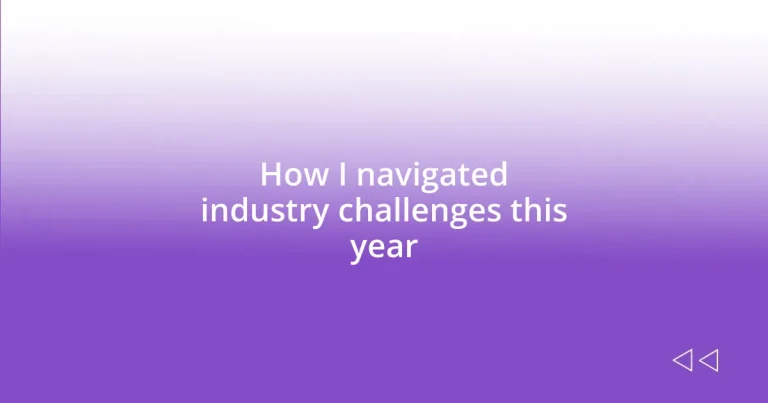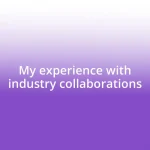Key takeaways:
- Supply chain disruptions highlighted the importance of timely deliveries and the need for expertise within the team.
- Creating a structured strategic action plan with clear objectives helped navigate various challenges effectively.
- Building a supportive network and engaging in mentorship greatly enhanced personal and professional growth.
- Embracing vulnerability, prioritizing mental well-being, and practicing gratitude transformed the approach to challenges.
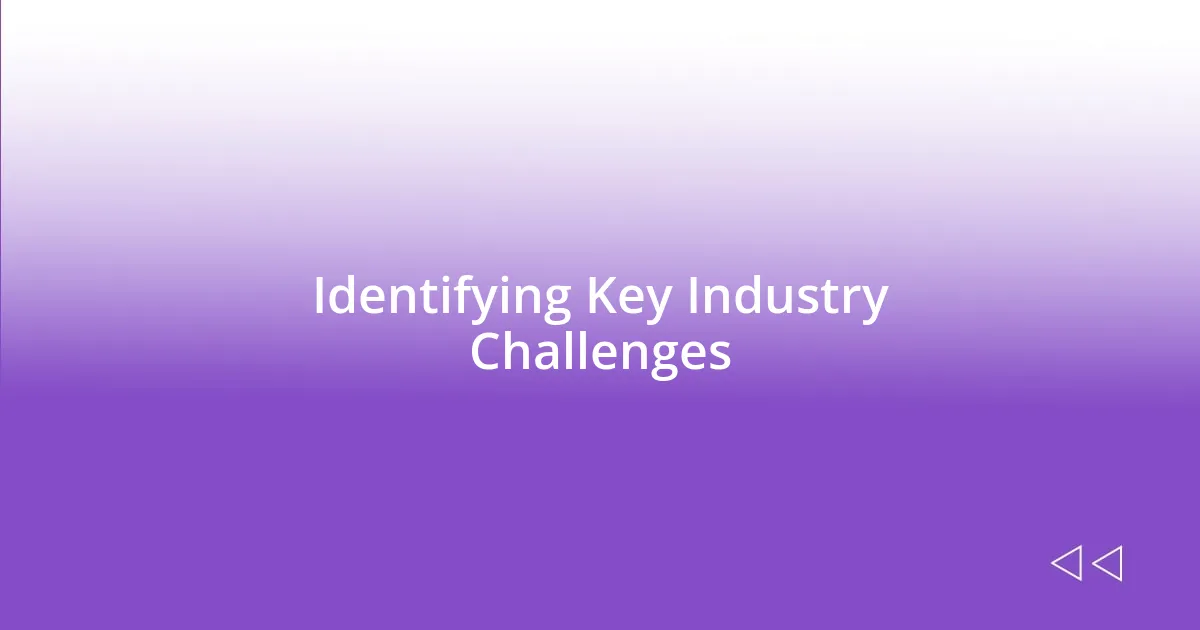
Identifying Key Industry Challenges
One of the hardest lessons I’ve learned this year relates to supply chain disruptions. I recall sitting at my desk, staring at an empty inventory report, and feeling that sinking feeling when I realized how reliant we are on timely deliveries. Have you ever found yourself in a similar situation, wondering how you could prepare for unexpected delays?
As I delved into the challenges, I noticed the skill gap within my team. It was tough to admit that despite our drive and determination, we were missing some crucial expertise required to adapt to sudden changes. I remember a specific instance where we faced a complex project and could have benefited from deeper knowledge in new technologies. Isn’t it surprising how shifting industry standards can expose gaps in our capabilities?
Adapting to ever-evolving regulations was another challenge that kept me up at night. I distinctly remember pouring over a lengthy new policy, overwhelmed by the unfamiliar jargon. I asked myself, how can I ensure compliance while also keeping my team focused on our goals? This experience reinforced the need for clear communication and education within our organization, a realization I believe many can relate to.
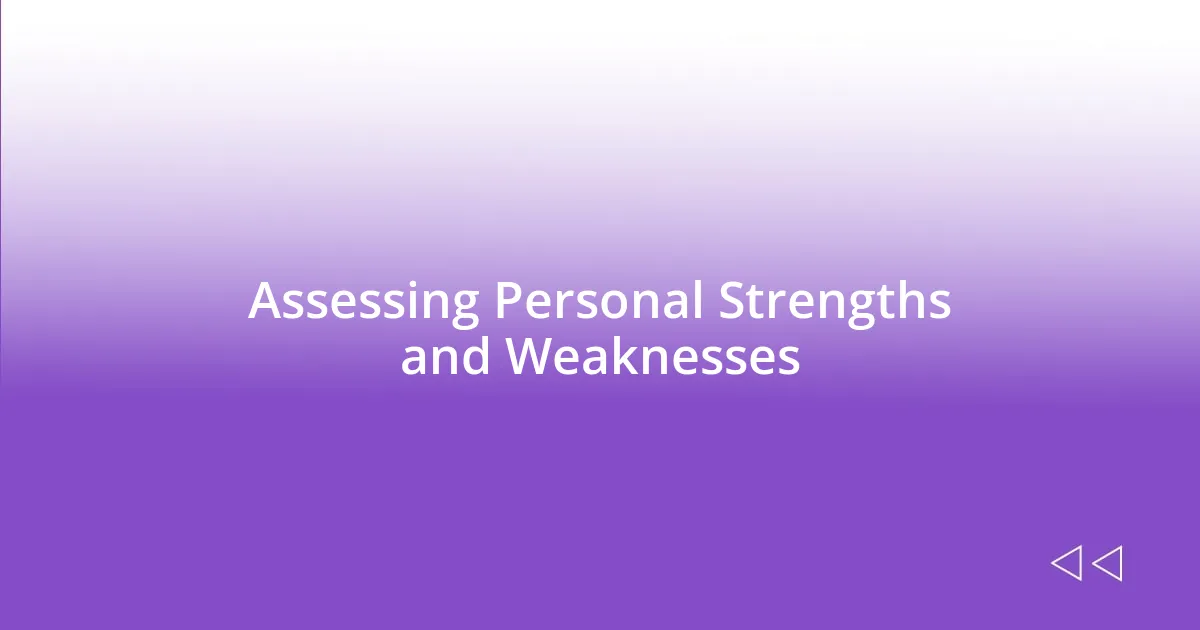
Assessing Personal Strengths and Weaknesses
Assessing my personal strengths and weaknesses has been a profound journey this year. I often find myself reflecting on my decision-making skills. For instance, during a particularly challenging project, I had to make choices quickly, and I was surprised at how effectively I could analyze options under pressure. Interestingly, it revealed my strength in crisis management, which I hadn’t fully recognized before. Have you had moments that made you appreciate your skills more?
On the flip side, I discovered a weakness I couldn’t ignore: time management. There were instances where my enthusiasm led me to overcommit, resulting in rushed outcomes. I vividly recall a day when I juggled several tasks, only to finish the day feeling unsatisfied with the quality of my work. It’s a sobering realization that recognizing our limitations is just as important as celebrating our strengths.
In reviewing my self-assessment, I also noticed that seeking feedback from colleagues has been incredibly beneficial. A candid conversation with a mentor opened my eyes to specific areas for improvement that I hadn’t considered. Embracing this vulnerability has allowed me to grow, leading me to ask myself the pivotal question: what if we all took the time to assess ourselves honestly?
| Strengths | Weaknesses |
|---|---|
| Effective crisis management | Poor time management |
| Quick decision-making | Overcommitting to tasks |
| Openness to feedback | Difficulty with self-discipline |
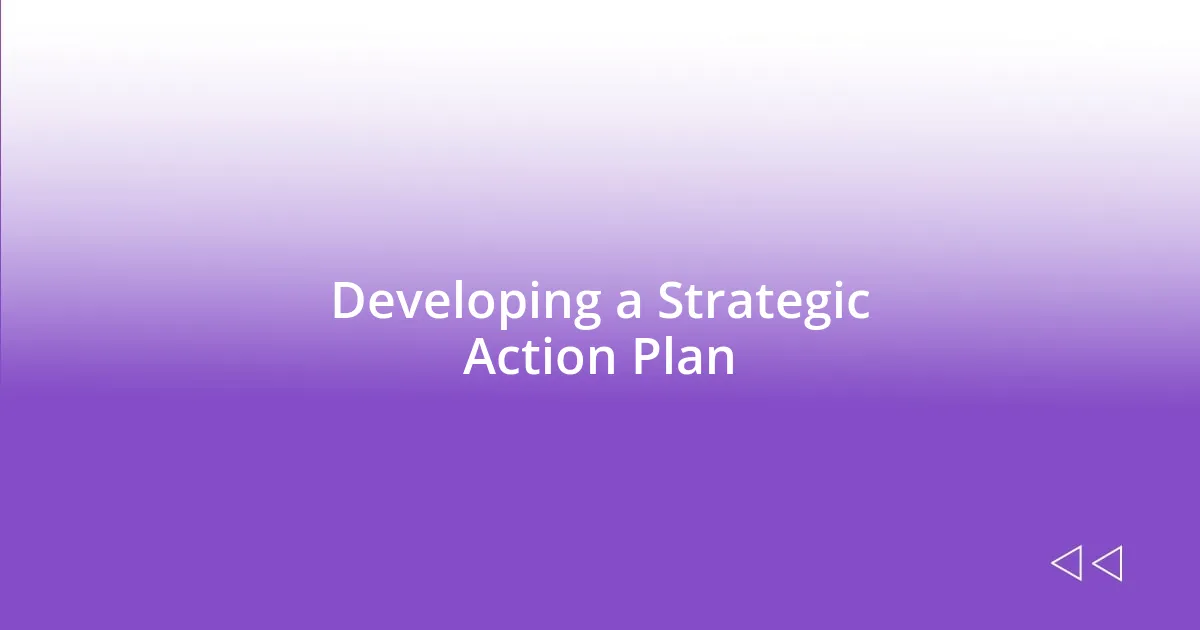
Developing a Strategic Action Plan

Developing a Strategic Action Plan
Creating a strategic action plan has been pivotal for navigating the various hurdles this year. I vividly remember the moment I sat down to map out my strategy. I used to think that spontaneity could carry me far, but I quickly learned that a structured approach was essential. I felt a sense of clarity wash over me as I outlined specific goals, timelines, and potential roadblocks.
To build a comprehensive action plan, I focused on a few crucial elements:
- Define clear objectives: Setting specific and achievable goals keeps the team aligned.
- Identify resources: Knowing what tools and personnel I had at my disposal gave me confidence.
- Develop a timeline: Establishing deadlines created a sense of urgency and accountability.
- Anticipate challenges: Thinking ahead about potential obstacles helped me devise contingency plans.
The emotional weight of this process can’t be understated. I felt a mixture of excitement and anxiety as I realized how much depended on this plan. There were nights when I couldn’t sleep, pondering whether each element was robust enough to withstand the industry’s unpredictability. In one instance, I even turned to a trusted colleague for brainstorming. Together, we pinpointed critical areas I hadn’t considered, which ultimately strengthened my strategies. Isn’t it amazing how collaboration can illuminate what we might overlook in our individual efforts?
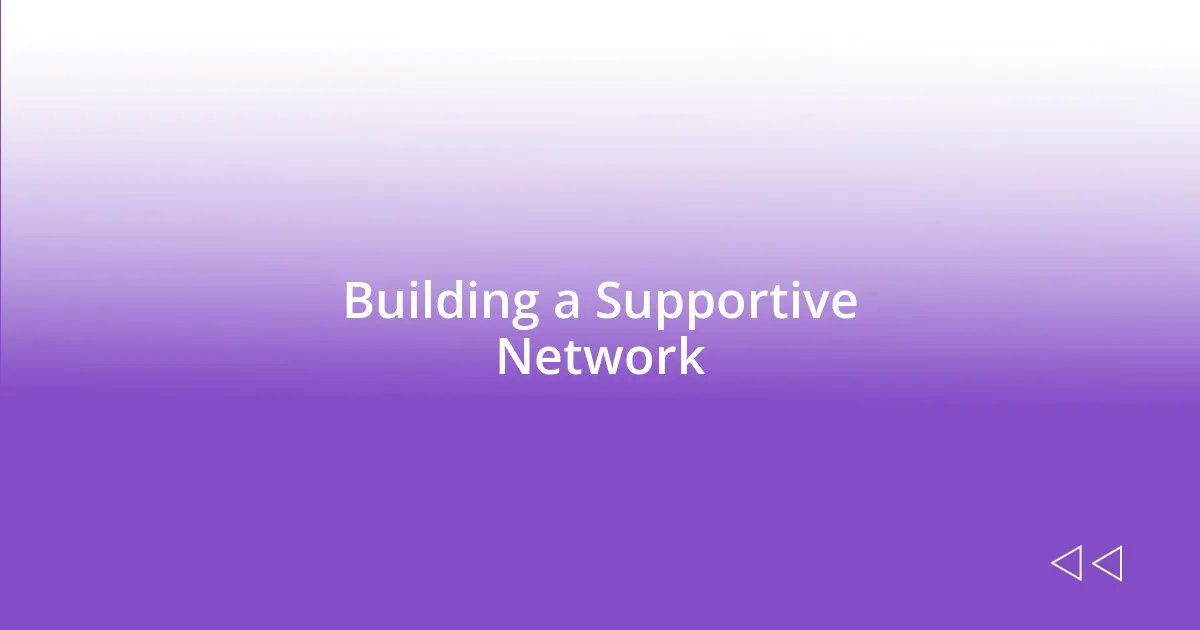
Building a Supportive Network
Building a supportive network has been one of the most transformative aspects of my year. I remember attending a local industry meetup, where I connected with professionals who shared their own experiences of navigating similar challenges. That night, amid laughter and shared struggles, I realized how essential it is to foster relationships that inspire and uplift. Have you ever found that special connection in a casual setting that sparked a possibility for collaboration or support?
In my journey, I discovered the power of mentorship. An informal chat with a seasoned professional turned into an ongoing dialogue, where we explored not just industry trends but also personal growth. I recall a particularly tough week when competing deadlines felt overwhelming. My mentor helped me reframe my mindset, viewing obstacles as opportunities. It was enlightening! I began to understand that having a supportive figure could shift my perspective dramatically. Where do you find your strength—internally or through the network you build around you?
Additionally, I’ve learned that offering support is just as important as receiving it. Actively participating in discussions and genuinely helping others create an environment of reciprocity. There was a moment when I offered to assist a colleague with a project; his gratitude reminded me of how essential it is to lift each other up. This reciprocity not only strengthens the bond within the network but also fosters a culture of loyalty and shared success. Isn’t it fascinating how supportive relationships can transform challenges into shared victories?
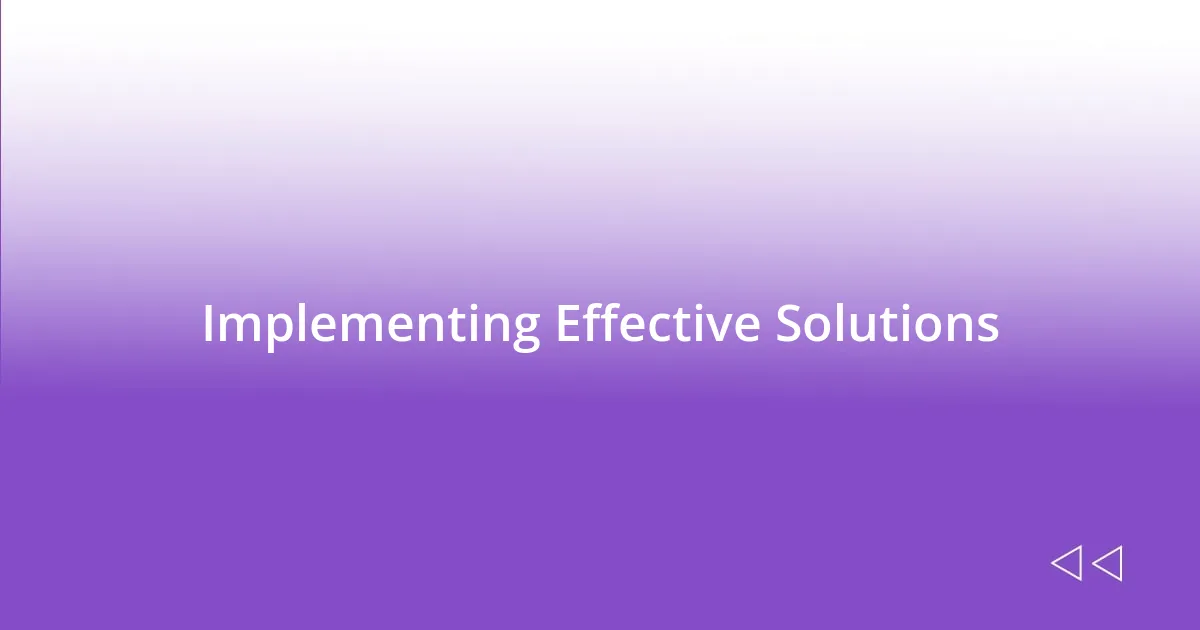
Implementing Effective Solutions
Implementing effective solutions required a thoughtful review of my strategies. I learned early on that mere ideas wouldn’t suffice; I had to translate them into actionable steps. One particularly challenging day, I faced a major decision about reallocating resources. I felt an overwhelming sense of responsibility, questioning if I was making the right choice. Ultimately, breaking down the problem into smaller, manageable parts allowed me to see the solution more clearly. Isn’t it interesting how simplifying complex issues can often lead us to the best path forward?
I also found value in continuous feedback. Each week, I would hold check-ins with my team to reflect on what was working and what wasn’t. I vividly recall a moment when a team member pointed out a flaw in our approach that I hadn’t noticed. Instead of feeling defensive, I embraced it as an opportunity for growth. This openness to critique created an atmosphere where everyone felt empowered to share their insights. How often do we overlook valuable feedback simply because we’re too focused on our own perspective?
Moreover, embracing a mindset of adaptability proved crucial. I remember a project that required a last-minute pivot due to unforeseen circumstances. The initial stress of changing course was daunting, but it forced me to think creatively and explore alternative solutions. Instead of seeing it as a setback, I chose to view it as a chance to innovate. In moments like these, I’ve realized the importance of resilience and flexibility. How often do we remind ourselves that adaptations can lead to breakthroughs?
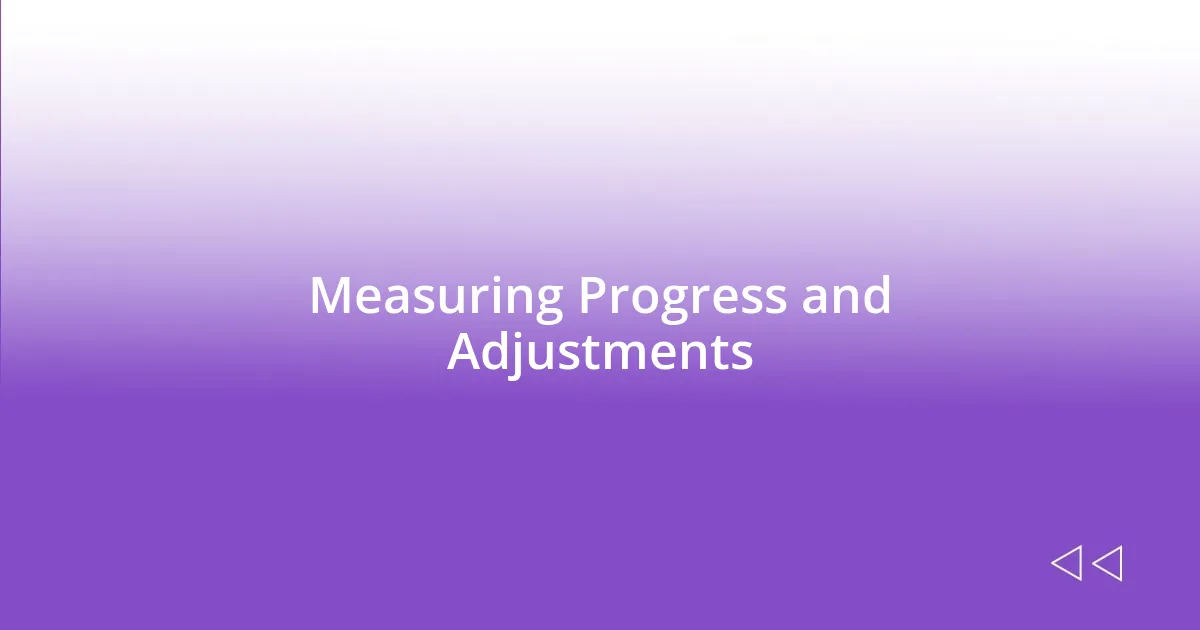
Measuring Progress and Adjustments
Measuring progress has become a vital part of my journey this year. Early on, I started setting specific, achievable goals to track my growth. I remember one afternoon, sitting with my planner, and noting each small success. It felt rewarding to see the tangible outcomes of my efforts. How do you celebrate your milestones—do you pause to appreciate your progress, or do you push on to the next challenge?
Adjustments became necessary when I realized not all strategies were effective. There was a moment when I invested significant time into a marketing campaign that just didn’t resonate. Instead of clinging to my original plan, I decided to pivot. Analyzing the data revealed insights I hadn’t considered; the customer base I thought I knew was evolving. By letting go of my initial assumptions, I discovered a new approach that not only met their needs but exceeded my expectations. When was the last time you had to change direction unexpectedly?
One invaluable lesson I’ve learned is to embrace incremental changes rather than waiting for monumental shifts. I remember a chat with a trusted colleague who advised me to focus on improving one aspect of my workflow each week. Small adjustments led to remarkably smoother operations. It’s funny how stepping back and making tiny tweaks consistently can lead to significant transformations over time. Have you ever experienced the power of doing less, but doing it better?
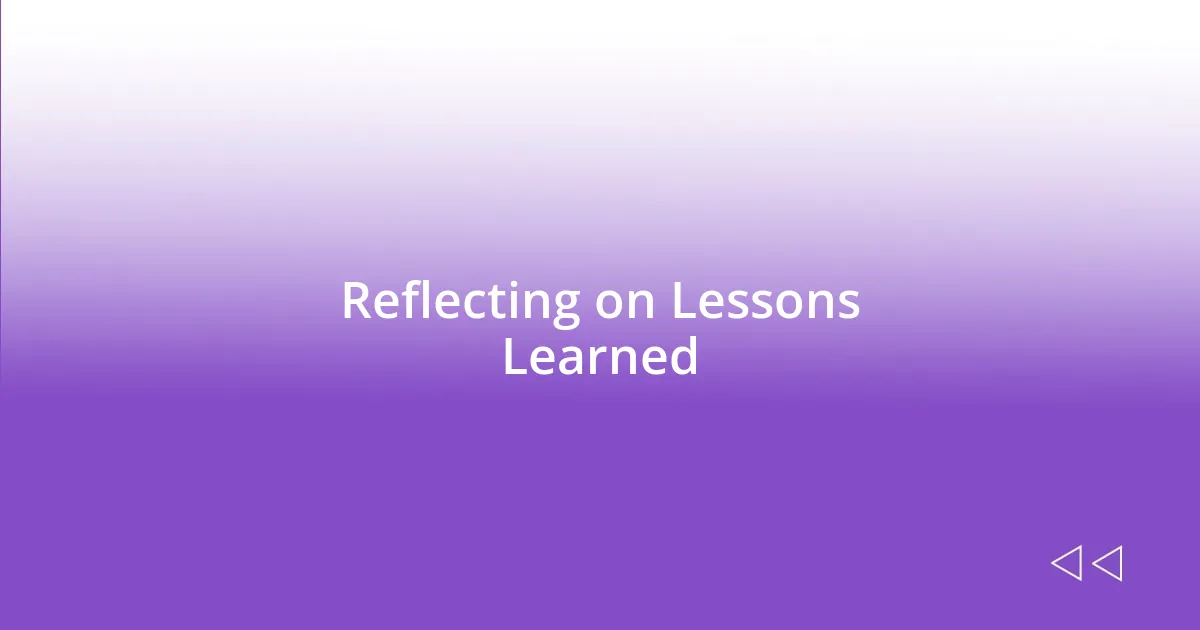
Reflecting on Lessons Learned
Reflecting on the lessons learned this year, I find that vulnerability has become an unexpected ally. There was a moment during a team meeting when I openly shared my uncertainties about a project. To my surprise, instead of creating a divide, it fostered an authentic dialogue. People transformed their hesitations into shared experiences, reminding me that admitting we don’t have all the answers can strengthen our connections. How often do we miss opportunities for collaboration because we feel we need to appear confident?
In another instance, I discovered the power of prioritizing mental well-being amidst the chaos. After a particularly demanding week, I took a step back and assessed my energy levels. I realized that pushing through fatigue wasn’t producing my best work. Allowing myself to rest and recharge—without guilt—enhanced my creativity and productivity. When was the last time you granted yourself permission to pause? It’s crucial to recognize that taking time for ourselves directly contributes to our success.
Lastly, I learned that gratitude can be a transformative practice in navigating challenges. Each evening, I began jotting down three things I was grateful for that day, no matter how small. This simple ritual shifted my mindset from focusing on what went wrong to celebrating the progress I made. I vividly recall being grateful for a team brainstorming session that sparked innovative ideas, reminding me how collaboration can elevate our efforts. How often do we consciously practice gratitude? Embracing it as a daily habit has cultivated a more positive outlook, making challenges easier to tackle.












